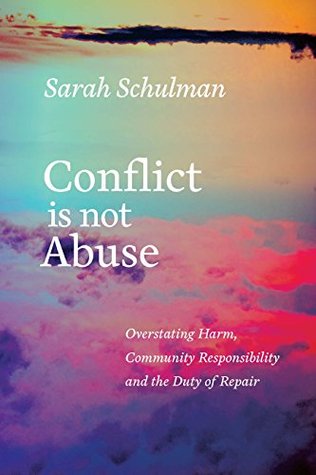More on this book
Community
Kindle Notes & Highlights
In other words, because we won’t change our stories to integrate other people’s known reasons and illuminate their unknown ones, we cannot resolve Conflict in a way that is productive, equitable, and fair.
Or as Matt Brim suggests, that when we are in the realm of Conflict, we can move from the Abuse-based construction of perpetrator and victim to the more accurate recognition of the parties as the conflicted, each with legitimate concerns and legitimate rights that must be considered in order to produce just resolution.
Namely, false accusations of harm are used to avoid acknowledgment of complicity in creating conflict and instead escalate normative conflict to the level of crisis. This choice to punish rather than resolve is a product of distorted thinking, and relies on reinforcement of negative group relationships, when instead these ideologies should be actively challenged.
Escalation is the key consequence of refusing to problem-solve or negotiate, and it demands our attention as a central obstacle to peace and justice.
The values required for social repair are the same values required for personal repair.
The refusal to actually ask someone what they think is happening and to instead insist on unilateral interpretations compounds misunderstanding and then injustice.
Part of peace-making is acknowledging that we can’t know everything about ourselves, and sometimes we reveal things to others that we are not ready to accept.
especially when one party makes a negative power-play by refusing to speak to the other in person. They then create the false problem of whether or not the two conflicted parties will speak at all, which makes addressing and progressing to the real source of anxiety impossible.
Refusal through email, texting, and other technologies keeps the person who doesn’t know how to problem-solve from learning how.
It keeps them imprisoned in their own imagined negative fears about the other, and their fantasies of their own potential humiliation or demise if they were to talk to the other person and thereby understand what the other person is thinking and feeling.
The real question is: Why would a person rather have an enemy than a conversation? Why would they rather see themselves as harassed and transgressed instead of have a conversation that could reveal them as an equal participant in creating conflict?
Is it the safety from psychological “power over” and actual harm? Or is it the safety from being made uncomfortable by accurate information that challenges one’s self-perception?
Asking hard questions and creating an environment in which complexities can be faced is, after all, what a real friend does.
What if we cared enough and took the time to have the full conversation, focusing on details? Not only could we get away from the buzz words and their implied helplessness or innocence, but we could finally do what friends, teachers, caseworkers, family, and community members are supposed to do: help the person to understand what is actually happening in their life, their role in it, and the impact of their past experiences on their present perceptions so that they can produce real choices about how to create peace and resolution. In other words, we could have honest relationships of depth. We
...more
“What was happening when the behavior occurred? What happened before? What was the outcome? What is the context?” • “How would you describe your partner?” • “Who makes the decisions? What usually leads up to a fight and how do they usually end?”
So truths can be complex, and complexity is articulated by its details. Anyone who refuses to hear the details is making a deliberate decision not to understand.
He somehow had gotten the wrong message that “being a good friend” meant not asking questions that reveal truths. Instead he was expected to join in, uninformed, on the condemnation of the woman.


